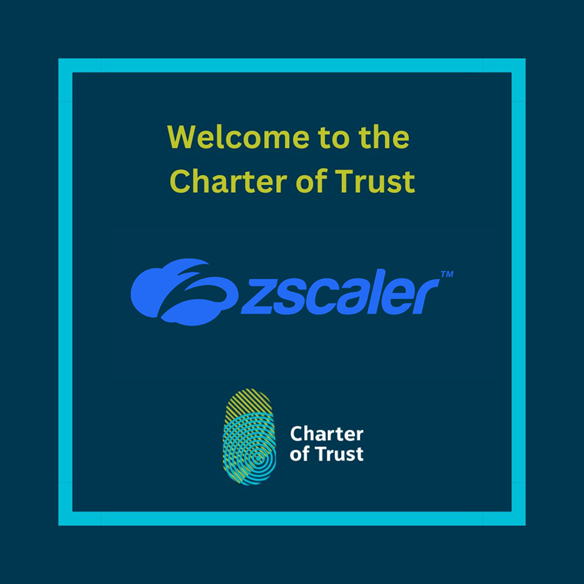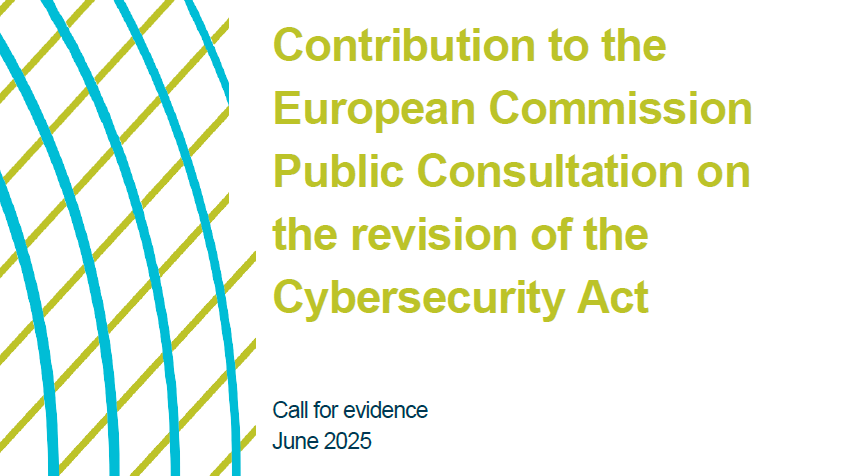We are excited to announce that Shared Assessments has officially joined the Charter of Trust Associated Partners Forum (APF), further reinforcing our mission to enhance global cybersecurity standards.
The APF is a collaborative network that brings together regulators, research institutes, universities, and think tanks with the Charter of Trust's contributing partners to strengthen the digital security landscape. The APF has grown over the years and already counts more than 15 partners from the Americas, Europe, and Asia.
"Shared Assessments is excited and honored to join the Charter of Trust community of cybersecurity leaders and practitioners, and we are committed to working with the organisation to improve the resilience and risk posture of their membership and their associated suppliers. Since its founding in 2018, the Charter of Trust has promoted continuous improvement in the standard of care for cybersecurity risk management. At Shared Assessments, we are fully aligned with the Charter’s vision, including the organisation’s 10 Principles and the philosophy that cybersecurity ‘is everyone’s task.’" says CEO Andrew Moyad.
Founded in 2005, Shared Assessments is a global membership organization dedicated to developing the best practices, education, and products to drive third-party risk assurance. Shared Assessments is a practitioner led organization with over 1’500 active professionals available to network across their 13 global committees disseminating papers, studies, and further research.
At Shared Assessments, the belief in collaboration and the exchange of knowledge plays a critical role in tackling today’s cybersecurity challenges. Together with them, Charter of Trust is working towards creating a stronger digital landscape across industries and borders by sharing the extensive knowledge our partners have.

PREVIOUS POST
Chairwoman Natalia Oropeza in Brandeins Magazine
NEXT POST
Charter of Trust Welcomes Zscaler

You may also like

Charter of Trust Welcomes Zscaler
We are thrilled to announce that we welcome Zscaler as the newest Partner to the Charter of Trust!
Zscaler is a leading cloud enterprise security provider helping global businesses accelerate their digital transformation by becoming more agile, efficient, resilient, and secure.
With Zscaler as a partner in the Charter of Trust, we aim to strengthen global cyber resilience through trust – by fostering actionable collaboration between industry leaders, governments, and public-private platforms. Zscaler brings robust expertise and innovation to the table, making it the ideal partner to drive this mission forward.
“Zscaler is excited to drive meaningful change alongside our new partners, laying a foundation of trust essential for successful digital transformation,” said Sam Curry, Zscaler CISO. “In today’s world, the need for reducing inherent trust and default access has never been greater. To truly stay ahead of ever-evolving threats, we must unite as a coalition of practitioners. Cyber attackers aren’t taking breaks, and with advancements like artificial intelligence, quantum cryptography, and emerging technologies on the horizon, collaboration is the key to securing the future.”
“We are proud to welcome Zscaler to the Charter of Trust. Their focus on cybersecurity innovation and commitment to openness reflect our shared ambition to create a safer, more resilient digital future. Together, we’ll strengthen trust, transparency, and security across the global digital landscape.” highlighted Dr. Summit Chada, Charter of Trust Co-Chair and COO Group Security & Business Lines CISO at Atos.
“With Zscaler as a Partner of the Charter of Trust, we believe that we can strengthen the global commitment to secure digital transformation by combining technological innovation with the Charter of Trust’s collaborative approach to cybersecurity leadership.” Ralf Schneider, Charter of Trust Co-Chair and Senior Fellow and Head of Cybersecurity and NextGenIT Think Tank at Allianz SE, welcomes Zscaler to the Charter of Trust.
We are excited to join forces and work together to advance digital trust and security across industries.
Zscaler is a leading cloud enterprise security provider helping global businesses accelerate their digital transformation by becoming more agile, efficient, resilient, and secure.
With Zscaler as a partner in the Charter of Trust, we aim to strengthen global cyber resilience through trust – by fostering actionable collaboration between industry leaders, governments, and public-private platforms. Zscaler brings robust expertise and innovation to the table, making it the ideal partner to drive this mission forward.
“Zscaler is excited to drive meaningful change alongside our new partners, laying a foundation of trust essential for successful digital transformation,” said Sam Curry, Zscaler CISO. “In today’s world, the need for reducing inherent trust and default access has never been greater. To truly stay ahead of ever-evolving threats, we must unite as a coalition of practitioners. Cyber attackers aren’t taking breaks, and with advancements like artificial intelligence, quantum cryptography, and emerging technologies on the horizon, collaboration is the key to securing the future.”
“We are proud to welcome Zscaler to the Charter of Trust. Their focus on cybersecurity innovation and commitment to openness reflect our shared ambition to create a safer, more resilient digital future. Together, we’ll strengthen trust, transparency, and security across the global digital landscape.” highlighted Dr. Summit Chada, Charter of Trust Co-Chair and COO Group Security & Business Lines CISO at Atos.
“With Zscaler as a Partner of the Charter of Trust, we believe that we can strengthen the global commitment to secure digital transformation by combining technological innovation with the Charter of Trust’s collaborative approach to cybersecurity leadership.” Ralf Schneider, Charter of Trust Co-Chair and Senior Fellow and Head of Cybersecurity and NextGenIT Think Tank at Allianz SE, welcomes Zscaler to the Charter of Trust.
We are excited to join forces and work together to advance digital trust and security across industries.
Read more
September 29, 2025
•

Contribution to the EU Commission Public Consultation on the revision of the Cybersecurity Act
The Charter of Trust welcomes the opportunity to participate in the European Commission’s public consultation on the revision of the Cybersecurity Act. As a coalition united by the goal of strengthening digital trust, we are pleased to share our consolidated response and recommendations.
We support Policy Option 2, which focuses on targeted regulatory measures that address key challenges without creating unnecessary complexity. In this context, we emphasize the need to enhance the role and resources of ENISA, to ensure effective implementation of both current legislation and the European Cybersecurity Certification Framework (ECCF).
Our recommendations aim to improve transparency, collaboration, and efficiency across the EU’s cybersecurity landscape. These include:
- Introducing clear timelines for the development of certification schemes.
- Enhancing stakeholder engagement throughout the process.
- Establishing more structured communication channels between ENISA, the Stakeholder Cybersecurity Certification Group (SCCG), and sectoral ISACs (Information Sharing and Analysis Centers).
We call for a stronger ECCF, one that is transparent, inclusive, and aligned with international standards to foster global interoperability and ease compliance for organizations across borders. Equally critical is the harmonization of certification practices across EU member states and the mutual recognition of certifications to minimize regulatory fragmentation.
The Charter of Trust advocates for technically robust, standards-based certification schemes, with well-defined roles and responsibilities. We also stress the need for clarity on the interplay between voluntary and mandatory certifications, particularly in relation to the upcoming Cyber Resilience Act (CRA).
To streamline compliance and reduce administrative burden, we propose a unified, risk-based incident reporting regime that consolidates requirements under regulations such as NIS2, CRA, GDPR, and DORA. This would not only simplify reporting for organizations but also enhance the EU’s overall cyber resilience. In addition, we recommend incorporating liability protections and grace periods for incident disclosure.
Finally, we urge the Commission to strengthen supply chain security by adopting a risk-based classification approach and establishing baseline cybersecurity requirements for ICT suppliers.
The Charter of Trust remains fully committed to supporting the European Commission in shaping a secure, resilient, and trusted digital future for Europe. We look forward to continued collaboration in building a cybersecurity framework that meets the needs of all stakeholders, today and in the years to come.
We support Policy Option 2, which focuses on targeted regulatory measures that address key challenges without creating unnecessary complexity. In this context, we emphasize the need to enhance the role and resources of ENISA, to ensure effective implementation of both current legislation and the European Cybersecurity Certification Framework (ECCF).
Our recommendations aim to improve transparency, collaboration, and efficiency across the EU’s cybersecurity landscape. These include:
- Introducing clear timelines for the development of certification schemes.
- Enhancing stakeholder engagement throughout the process.
- Establishing more structured communication channels between ENISA, the Stakeholder Cybersecurity Certification Group (SCCG), and sectoral ISACs (Information Sharing and Analysis Centers).
We call for a stronger ECCF, one that is transparent, inclusive, and aligned with international standards to foster global interoperability and ease compliance for organizations across borders. Equally critical is the harmonization of certification practices across EU member states and the mutual recognition of certifications to minimize regulatory fragmentation.
The Charter of Trust advocates for technically robust, standards-based certification schemes, with well-defined roles and responsibilities. We also stress the need for clarity on the interplay between voluntary and mandatory certifications, particularly in relation to the upcoming Cyber Resilience Act (CRA).
To streamline compliance and reduce administrative burden, we propose a unified, risk-based incident reporting regime that consolidates requirements under regulations such as NIS2, CRA, GDPR, and DORA. This would not only simplify reporting for organizations but also enhance the EU’s overall cyber resilience. In addition, we recommend incorporating liability protections and grace periods for incident disclosure.
Finally, we urge the Commission to strengthen supply chain security by adopting a risk-based classification approach and establishing baseline cybersecurity requirements for ICT suppliers.
The Charter of Trust remains fully committed to supporting the European Commission in shaping a secure, resilient, and trusted digital future for Europe. We look forward to continued collaboration in building a cybersecurity framework that meets the needs of all stakeholders, today and in the years to come.
Read more
June 19, 2025
•

Advancing Regulatory Alignment at RSA Conference 2025
In the face of rising global cyber threats, over 50 CISOs have called for greater international alignment of cybersecurity regulations to strengthen defenses and reduce fragmentation. This message was echoed at RSAC 2025, where experts from the OECD, European Commission, academia, and industry emphasized the need for principle-based collaboration. The Charter of Trust, a long-time advocate for regulatory harmonization, continues to support coordinated, effective approaches that prioritize clarity over complexity.
Read more
May 01, 2025
•



